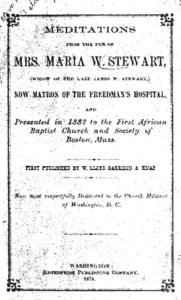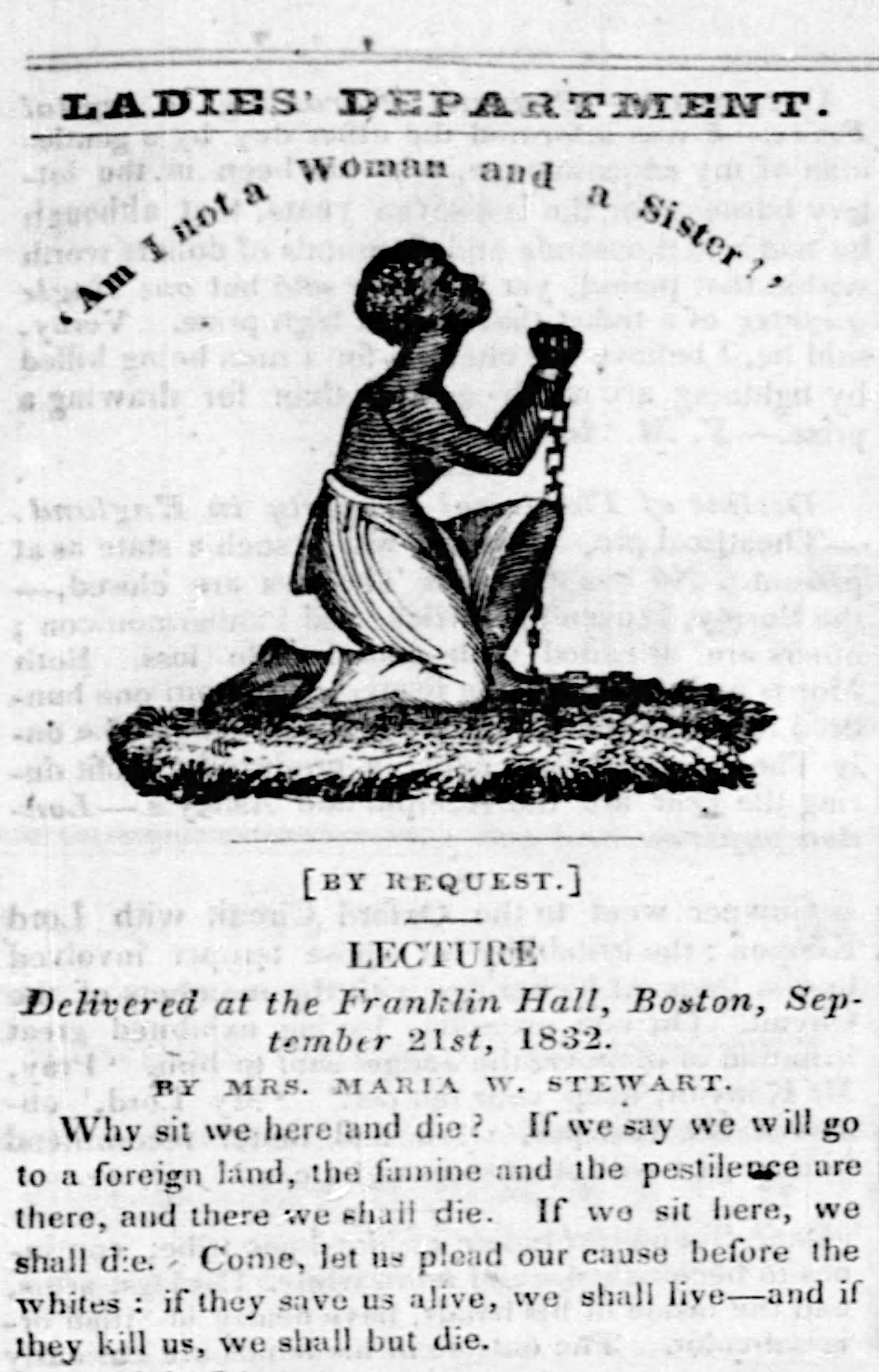Maria W. Stewart, best known as one of the earliest female public speakers, was born Maria Miller in Hartford, Connecticut, in 1803. Her parents’ first names and occupations are not known. Stewart was orphaned by age five and became an indentured servant, serving a clergyman until she was fifteen. She also attended Connecticut Sabbath schools and taught herself to read and write.
In 1826 Miller married James W. Stewart. Her husband, a shipping agent, had served in the War of 1812 and had spent some time in England as a prisoner of war. With her marriage, she became part of Boston’s small free black middle class and soon became involved in some of its institutions including the Massachusetts General Colored Association, which worked for immediate abolition of slavery. When James W. Stewart died in 1829, the white executors of her husband’s will took her inheritance through legal actions, leaving her penniless.
Soon after Boston abolitionist William Lloyd Garrison established his newspaper, The Liberator, in January 1831, he specifically called for black women to write in its pages. Stewart was the first woman to respond, and, by the summer of 1831, he published her first essay, Religion and the Pure Principles of Morality, as a pamphlet. Building on that notoriety, Stewart launched her public speaking career at a time when women were banned from speaking in public, especially to audiences that included men.
In her first address, in April 1832, Stewart spoke before a women-only audience at the African American Female Intelligence Society, an institution founded by the free black community of Boston. Speaking to that audience, she used the Bible to defend her right to speak and lectured on religion, justice, and equality.
On September 21, 1832, Stewart delivered a second lecture, this time to an audience that also included men. She spoke at Franklin Hall, the site of the New England Anti-Slavery Society meetings. She called for civil rights for northern blacks and questioned emigration to Africa, which was then promoted by the American Colonization Society.
Garrison published both speeches in the pages of The Liberator. He published the text of her speeches there, putting them into the Ladies Department. He also published a second pamphlet of her writings as Meditations from the Pen of Mrs. Maria W. Stewart.
On February 27, 1833, Stewart delivered her third public lecture, “African Rights and Liberty,” at the African Masonic Hall. Her fourth and final Boston lecture before moving to New York was a “Farewell Address” on September 21, 1833, when she addressed the negative reaction that her public speaking had provoked, expressing both her dismay at having little effect, and her sense of divine call to speak publicly.
In 1835 Garrison published a pamphlet with her four speeches plus some essays and poems, titling it Productions of Mrs. Maria W. Stewart. All the pamphlets created a much wider audience for Stewart’s work and inspired other white and black abolitionist women to become orators.
After moving to New York City, Stewart remained an activist, attending, for example, the 1837 Women’s Anti-slavery Convention, but she never again spoke in public. She supported herself by teaching in public schools in Manhattan and Brooklyn and eventually became an assistant principal of the Williamsburg School in Brooklyn.
Apparently after losing her teaching position in New York, Stewart moved to Baltimore in 1852 or 1853. There, she taught privately. In 1861, she moved to Washington, D.C., where she taught school again during the Civil War. Around 1870 Stewart was appointed to head housekeeping at the Freedmen’s Hospital and Asylum in Washington, D.C. Following Sojourner Truth in the post, she managed the cleaning staff.
In 1878 when she was seventy-five, Stewart began receiving an eight-dollar-a-month widow’s pension based on her husband’s service in the U.S. Navy in the War of 1812. She used the pension, including some retroactive payments, to republish Meditations from the Pen of Mrs. Maria W. Stewart, adding material about her life during the Civil War. The book was published in December 1879 just before her death on December 17 in the Freedman’s Hospital.


